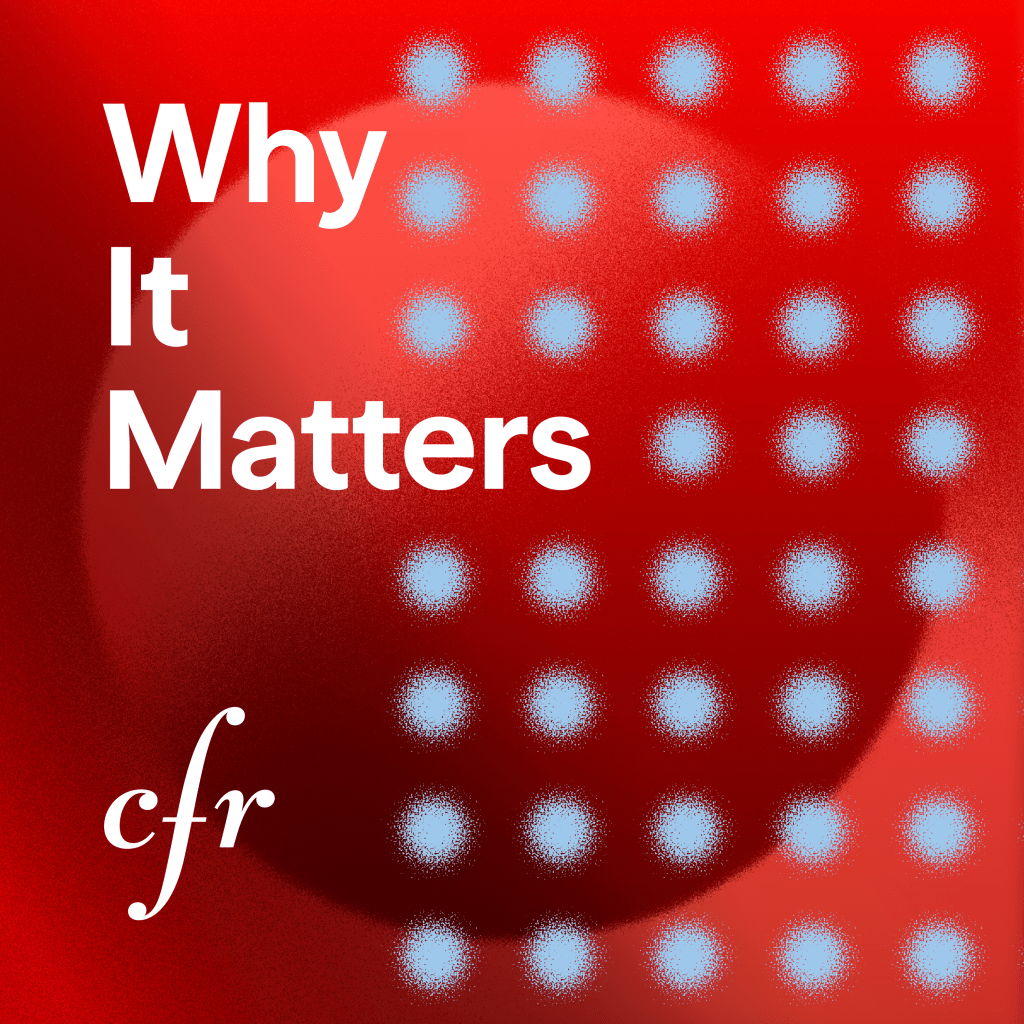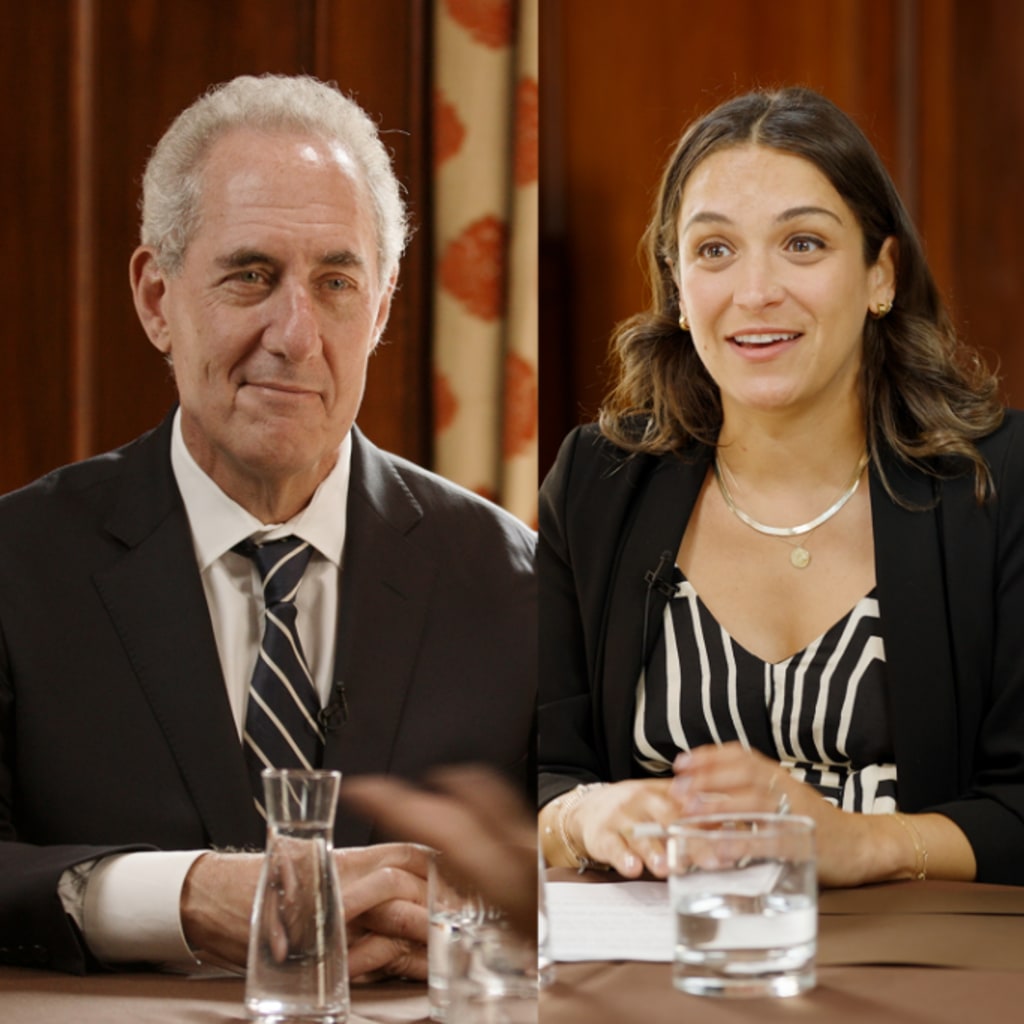The New Tech World Order
For most of our history, the realm of international relations was dominated by nation-states. They waged wars and signed treaties through the framework of governance. But today, more so than ever before, tech titans are acting as unilateral decision makers, upsetting the balance and structure of global power around the world.
Published
Host
- Gabrielle SierraDirector, Podcasting
Guests
- Adam SegalIra A. Lipman Chair in Emerging Technologies and National Security and Director of the Digital and Cyberspace Policy Program
- Rana ForooharDeputy Editor, U.S. and International Editions, Newsweek
Supervising Producer
- Asher RossLead Content Strategist
Associate Podcast Producer
- Molly McAnanyProducer, Podcasts
Audio Producer and Sound Designer
- Markus ZakariaAudio Producer & Sound Designer
Show Notes
For what seems like decades, everyone has been talking about emerging technology, whether it’s artificial intelligence wiping out job sectors or investment in renewables and electric vehicles. But today, big technology firms, including Meta and Microsoft, increasingly behave like sovereigns in the digital world—and companies such as SpaceX are beginning to do so in the physical one. These technologies are oftentimes championed by the U.S. government to fulfill national security interests, yet are accelerating at a pace lawmakers can’t keep up with, making it incredibly hard for Washington to rein these tech giants in. What happens when big tech becomes too big?
From CFR
Catherine Powell, “Deepfake of Kamala Harris Reups Questions on Tech’s Self-Regulation”
From Our Guests
Rana Foroohar, “Big Tech Must Be Scared,” Financial Times
Rana Foroohar, “What If Elon Musk Ran the Economy?,” Financial Times
Rana Foroohar, “Why Big Tech Wants to Keep the Net Neutral,” Financial Times
Adam Segal, “The Coming Tech Cold War With China,” Foreign Affairs
Adam Segal, The Hacked World Order
Read More
Adrienne LaFrance, “The Rise of Techno-authoritarianism,” Atlantic
Adam Satariano, Scott Reinhard, Cade Metz, Sheera Frenkel, and Malika Khuran, “Elon Musk’s Unmatched Power In the Stars,” New York Times
Chris Alcantara, Kevin Schaul, Gerrit De Vynck, and Reed Albergotti, “How Big Tech Got So Big: Hundreds of Acquisitions,” Washington Post
HEC Paris Insights, “Why Big Tech Will Remain Beyond Government Control” Forbes
Watch and Listen
Ian Bremmer, “The Next Global Superpower Isn’t Who You Think,” TED
Transcript
Throughout modern history, governments have worked with, and invested in, privately owned companies to spur innovation and advance national agendas. From the production of weapons to the development of communications technology, these partnerships have proven fruitful, if in some cases controversial over the years.
There is no better example than Washington’s partnership with the U.S. tech sector. Starting in the 1990s, with the help of government funding and a loose approach to regulation, technology companies produced innovation after innovation. This boosted U.S. financial markets to unprecedented heights, and allowed the U.S. tech sector to dominate its competitors in other countries. In a break with historical moments like the Manhattan project or the space race, the most advanced tech in the world began coming out of private American companies, rather than government directed projects.
The arrangement was wildly successful in an era of relative peace and low-level threats to U.S. national security. But many say that it is showing some cracks in a new era of increasing competition between the United States, Russia, and China. And many experts are growing increasingly concerned.
And that’s because the government now relies on trillion dollar companies such as SpaceX, Amazon and Google for things like space travel and satellite intelligence, companies that could potentially put their own preferences above national interest when it comes to foreign policy and security.
I’m Gabrielle Sierra and this is Why It Matters. Today, are private tech companies becoming geopolitical actors?
Gabrielle SIERRA: Lately there’s been a lot of talk about large tech companies influencing policy, foreign policy. We’ve seen this for decades domestically, but why is this argument gaining steam now?
Rana FOROOHAR: I mean, really for the last 20 years or so, private power relative to public power, has been growing, gosh, in almost every developed country in most industries. But it’s been particularly pronounced in the U.S. in tech.
This is Rana Foroohar. She is the global business columnist and associate editor at the Financial Times, the global economic analyst for CNN, and an author.
FOROOHAR: And so taking tech in particular, you now have these private actors in the form of the largest platform companies, the Googles, Meta. But you also have something like Elon Musk’s Starlink, which is actually a private company that is truly fulfilling the role of something that used to be done by the state.
SpaceX accounts for more than $15 billion in government contracts with top contributions coming from NASA and the Department of Defense. And in 2022, Microsoft, Google, Oracle, and Amazon shared a $9 billion contract to provide cloud computing services to the Department of Defense.
Let’s imagine a scenario where Microsoft eventually has full control over artificial intelligence and chooses not to share all developments with the government, but instead releases a new product in China. Or maybe SpaceX stops wanting to work with NASA and then eventually the company colonizes Mars and establishes it as a privately owned resort town.
I know, this may sound far-fetched, but it illustrates concerns about the power these companies have when it comes to making decisions about our world, especially when they wield near total control over technologies like AI, satellites, and social media.
SIERRA: So does it worry you?
Adam SEGAL: It does.
This is Adam Segal. He is the director of the Digital and Cyberspace Policy program at CFR. Adam also recently spent a year with the state department, leading the development of a U.S. International Cyberspace and Digital Policy Strategy.
SEGAL: All of these decisions to outsource a lot of these technologies to the private sector made more sense when you weren’t really thinking about great power competition. When you’re fighting the war on terrorism, and you’re fighting about ISIS and other types of actors, those decisions don’t have the same impact, and you can just get the technology as fast as you can. But now that we’re in great power competition, it’s a different kind of world. And especially for somebody like SpaceX or Musk who has businesses across the world, in China in particular, the tensions around that are much greater.
It is not an easy position to be in. The U.S. government is operating in a tense and competitive multi-polar world. So far, it has largely prioritized innovation and growth in order to maintain a competitive lead over China and others. And this has largely meant a loose approach to tech regulation.
And the discussion about regulation continues to evolve as Donald Trump prepares to take office. It was recently announced that Musk and Vivkek Ramaswamy, two entrepreneurs, will lead a new “Department of Government Efficiency.” Trump has said this department will “pave the way to dismantle bureaucracy, slash excess regulations, and restructure federal agencies.”
SEGAL: The U.S. private sector is one of the great strengths of the United States. It’s what drives innovation. It’s what’s given us all these great technologies. It’s an amazing source of soft power. People want to come to the United States and become the next Elon Musk or Bill Gates or whoever else. In the strategy that I helped write in the state department, when I went to the state department, we have a whole section about working with the private sector and how important that is to the U.S. government. But the U.S. government is held to certain types of accountability because it’s elected. The Congress oversees it or everything else, and tech companies don’t have that accountability. They’re accountable to the market, they’re accountable to their shareholders, but they’re not accountable for foreign policy.
The United States International Cyberspace and Digital Policy Strategy states that “The Department of State cannot accomplish its objectives without strong partnerships with the private sector, civil society, academic, and technical communities. New innovations spring from the private sector, and the decisions tech companies make on how their systems are developed and deployed have profound implications for how U.S. values and interests are realized...” It goes on to say that “Trusted technology suppliers...are essential partners in efforts to expand connectivity through open, secure, and resilient networks across the globe.”
SIERRA: So, what’s the worst that could happen here?
SEGAL: Well, the worst that can happen is that the U.S. government thinks that there’s something in its national interest that it wants to get done, and a tech company says no. Either for financial reasons or because the CEO of that company doesn’t agree with U.S. foreign policy and takes it upon his or herself to say, “I’m not going to do that.” So I think we are used to the U.S. being able to pretty much do what it wants in foreign policy. I mean, with constraints of Congress and the American people and other countries. We’re not used to one person or certainly one company saying, “Yeah, I’m not going along with that.”
SIERRA: I mean, as far as I know our foreign policy is supposed to be carried out by the U.S. government, and yet we are discussing these decisions potentially just fully being made by powerful tech companies. Is that even legal?
SEGAL: It’s not illegal. I think it has to do more with just where the power is these days, and a shift in capabilities. I mean, look, this is not a totally new thing. The British East Indian companies and the Dutch East Indian companies for a while had their own foreign policies too. In fact, they had their own militaries.
Okay this is wild and totally true! The East India Company had a standing army of over 250,000 soldiers, which, at certain points in the early-19th century, was twice the size of the British Army. And as long as profits to the Crown continued to roll in, the British refrained from pushing any sort of regulation over the company’s business.
SEGAL: And so as long as there have been companies and they have economic interests, they have often pushed against or... either complemented or gone against the foreign policy of their home country. So it’s not new. U.S. oil companies have played a similar role. We had this massive shift in the eighties and nineties. U.S. R&D spending, as a percentage of what the federal government spent, basically went flat. And the private sector picked a lot of that up. So while we are living in the time where we’re benefiting from U.S. government R&D, right iPhone, the internet, we’re now at the tail end of that. And so now, most of the cutting edge research in AI, in space technologies and autonomous vehicles, semiconductors is happening in the private sector. And so we do live in an age now where the tech companies are going to have more cutting edge technology than most of the U.S. government.
As a result, the government must increasingly tap the brains and resources of private tech companies in order to pursue its objectives.
SIERRA: Okay but you say this is not new, so then what separates companies like SpaceX or Meta from the East India Companies of the past?
SEGAL: Yeah. I think in the past it was really companies focusing on extracting resources from other countries and wanting to make sure that those governments were friendly to them. So the oil companies, the Chiquita/Doles of the world, even the British East India and the Dutch East Indian companies it’s all about extraction of that. That’s not what’s really happening with the tech companies. I mean, yes, they want access to data, but they’re not overthrowing governments so they could get access to data. It’s just refusing to do what governments want them to do. So I think in some ways it’s a broader, but less sharp type of power. So they’re not supporting right-wing militias, and they’re not funding civil wars and all the things that the companies sometimes did in the past. But the reach is so much broader because the technology just touches so many more people. But I think what’s new is the degree of power that they have and that the tech companies pretty much touch everyone around the world. And you know, the oil companies was kind of more indirect. If you don’t live in an oil producing country, yes, you still need oil, but the oil companies were probably not intervening with your domestic politics in the same way that they were if you produced oil. But the tech companies, because they collect data around the world, pretty much touched on everybody.
Apple operates in 175 countries, Microsoft in over 190 countries, and Google in over 210 countries.
FOROOHAR: They certainly hold more power by a number of different metrics. One would be market cap. I mean, these are literally the largest and most powerful companies that have ever been seen in the history of the planet. I mean, the first trillion-dollar companies are tech companies. In terms of the profit margins, yeah, huge, high double-digit profit margins. That’s really unheard of.
To put this into perspective, the largest companies in the world Apple, Nvidia, Microsoft, and Google are worth more than $12 trillion combined. That’s more than the GDP of every country in the world besides the U.S. and China.
FOROOHAR: Also, the ability that these companies have had to move across borders, which is something that may be changing for geopolitical reasons. But I like to pull back and look at the whole paradigm of globalization, which was basically about the idea that capital goods and labor can all move around the world wherever they want. Well, capital always traveled faster than either goods or people. That’s why banks got so big, and that’s why the financial economy got so big. But data can travel even faster than capital can. And so globalization has just put these companies on steroids, and they really are a private power of a kind that I think we’ve never seen.
SIERRA: Spell it out for me a little bit. What factors might make lawmakers and executives reluctant to challenge tech titans? What does the government seem reluctant to regulate, and what do we stand to lose?
FOROOHAR: There’s a national champions argument that’s being put forward at a time when the U.S. and China are decoupling, de-risking in a cold war, whatever you want to call it. A lot of American tech firms have kind of tried to portray themselves as, “Hey, we’re the U.S. champions here.” Private actors are private actors, they’re profit making entities, they want to make profits no matter where they are in the world. But there’s this kind of myth that’s been put forward and people sort of buy into it that we need to protect these companies, otherwise we won’t win the tech war against China. The national champions‘ argument also gives these companies an opportunity to make arguments that, “Well, China is a state run monopoly. You know, do you want to have China running the world’s digital ecosystem, or do you want to have five U.S. companies running it?” And a lot of policymakers and even certain labor advocates, defense hawks, will buy into that argument.
SIERRA: I want to throw a term at you, because who doesn’t love new words? What is a technopolar order, and are we moving closer toward one?
SEGAL: So I think it’s Ian Bremmer’s term...
Ian Bremmer/TedX: If the digital order becomes increasingly dominant and governments erode their capacity to govern - and we’ve already seen the beginning of this - technology companies will become the dominant actors on the global stage in every way and we will have a technopolar order.
SEGAL: Broadly, the idea is that we’re used to the idea of a multipolar world, which is we used to have a bipolar world, the U.S. and the Soviets. Then the multipolar world is the US, China, India, the EU, Russia. So a technopolar world is, ‘Well, we have the nation states and now we have the tech players, another set of power.’ We’ve had these types of arguments around other types of organizations in the seventies and eighties and nineties. So people would talk about International organizations were a new type of center of power, NGOs were a different set of power. So throughout the history of political science, which is not a particularly interesting history, but there have been people who have written about other types of polarity and looking at actors that are non-state. So technopolar would be kind of in that historical lineage. I’m a pretty strong statist. And while I definitely think there are new challenges, I don’t think we’re in a technopolar moment. I think we’re at a moment where the tech firms affect, shape, limit, amplify state power, but it’s still really only states that can invade countries and arrest people and do all those really, really coercive things. But certainly, you give your data to all the same companies that I give my data to. And there are certainly things that I could not do without the tech companies, so.
SIERRA: It gives them a lot of power. Yeah.
SEGAL: Yeah.
SEGAL: I think the case that’s probably most well-known is Starlink. So Elon Musk’s internet communication company provided through SpaceX so many satellites that are placed in orbit and provide high bandwidth internet to places that are generally not connected to the internet, and have become essential to Ukraine, to their defense, to their e-government services. And there’s been a lot of reporting that Musk has made personal decisions about where those systems can operate. And that has affected, in some cases, the actual conduct of the war, how far Ukrainian forces can go into Russian territory and what Russian forces can do in Ukrainian territory.
KVUE: SpaceX CEO Elon Musk said over the weekend, the company Starlink’s internet satellites are now active over Ukraine.
Euronews: Elon Musk is again under fire, this time because he’s threatening to cut off financial support for his Starlink satellite terminals in Ukraine.
CNN: Musk effectively sabotaged a military operation by Ukraine, a U.S. ally, against Russia, an aggressor country that invaded a U.S. ally.
In 2023, SpaceX launched over 2,000 Starlink satellites, averaging a launch every five days. Today, Starlink controls about two-thirds of all active satellites orbiting Earth, operating across 99 countries, including Ukraine.
SEGAL: So the war in Ukraine gets expanded so that the Russians invade full-scale invasion in February, and lots of physical and cyber attacks on Ukrainian infrastructure, internet and other types of telecommunication which go down and are more susceptible to attacks. And the Ukrainians rely on Starlink for a lot of military communications. Starlink was providing that free to the defense department, which was then providing it to Ukraine.
Since the Russian invasion, battlefield communications have depended on the continued use of Starlink. And around 42,000 Starlink terminals are used in Ukraine by the military, hospitals, businesses, and aid organizations.
SEGAL: And as the Ukrainian and Russian forces are fighting, there is an extent that Ukraine wanted to do attacks past the border into Crimea, which Musk thought would be escalatory. Given that Crimea had been seized in the earlier conflict, he essentially said, “This will cause a nuclear conflict, and I’m not going to allow Ukrainian forces to use Starlink past this border.”
Elon Musk/All-In Podcast: While I don’t think it’s on the same scale, there was certainly that potential of sort of a mini Pearl Harbor escalation of hostilities... This would not defeat Russia, it would enrage Russia.
SEGAL: And that’s what happened. And so the Ukrainians could not operate beyond that border. And whatever the military operation was they had planned did not happen.
Musk later disputed some accounts of this incident, saying that Starlink access had never been present in the region, and that he had merely refused to turn access on in support of the attack.
It followed an earlier incident in 2022 when 1,300 Starlink terminals were turned off because the Ukrainian government could not pay the monthly bill. This required that the Pentagon strike a deal with SpaceX to keep Starlink satellite internet available in the country.
Both incidents serve to act as an example of what it can mean when one company or even one person winds up in charge of these types of foreign policy decisions. And as tech leaders continue to gain outsized power, Musk’s role in Ukraine sets a precedent for tech companies and the decisions they make in the future.
FOROOHAR: It’s kind of incredible that you have a single company, particularly one that is run by such a singular individual that has this level of power in a sphere that has really been the public sphere. Elon Musk has the power to keep the Ukrainian internet up and running, but he also has the power to take the internet down if he wants. I mean, it’s just Elon with SpaceX, with Starlink has understood that just as really almost every part of the economy on the planet has been privatized, that space itself would also be privatized, that communications could be privatized. So it’s just another venue for what we’ve already seen. But because we’re talking about communications and we’re talking about space and we’re talking about defense and areas that have been the purvey of the military, it’s just a big shift.
But the partnerships with SpaceX have led to some incredible feats.
In 2020, SpaceX sent the first NASA astronaut to space since 2011. Since then, the company has made over 40 visits to the International Space Station, launching 10 crewed flights on behalf of the U.S. government. And this past October, SpaceX successfully completed the world’s first rocket booster recapture.
The company’s reliability and innovations have not gone unnoticed. As of 2022, SpaceX pulled ahead of Boeing and several other historical partners as one of NASA’s top contractors after only 20 years in the industry.
SEGAL: We’re seeing that the U.S. government’s reliance on SpaceX. Right, we’ve had this long discussion about the U.S. astronauts being stranded at the International Space Station because the Boeing launcher, which is usually that we think about the U.S. government having so many technical issues, that NASA’s afraid to bring them back in that. But yeah, you’re reliant on SpaceX to put up lots of U.S. satellites into space there. So again, another choke point where the U.S. government made decisions that made sense in a different world.
In many cases, the choices of the tech firms within these partnerships are totally aligned with U.S. foreign policy goals - for example this September, Indian Prime Minister Narendra Modi met with tech company CEOs to discuss semiconductor production as part of the U.S.-India Comprehensive Global and Strategic Partnership.
But that’s not always the case.
Another point of contention that has made news for Elon Musk is tensions between Taiwan and China.
SEGAL: Taiwan is entirely dependent on sub-sea cables, which could be easily cut, and then you’d have to move to satellite communications. And Musk himself has basically suggested that Taiwan should go back to China. Taiwanese were like, “Yeah, we don’t really like that.” And then Taiwanese are now trying to figure out, “Do we need to launch our own satellites? What do we need to do?”
Satellite internet would be critical for Taiwan in a conflict with China, a scenario that would usually make them a candidate for Starlink access. In response to Musk, the island’s foreign minister said, “Taiwan is not part of the PRC and certainly not for sale!” Musk’s statement, originally said at a summit, came after an earlier statement he made to the Financial Times, recommending a “special administrative zone for Taiwan.”
The island has chosen to pursue other satellite options in light of Starlink’s record in Ukraine, Musk’s own commentary, and his business ties to mainland China.
But again, the assistance of technology companies has also led to much needed help for our allies.
SEGAL: Also drawing from Ukraine on what is probably thought of as a more positive example is the role that private tech companies have played in the defense of Ukraine. So we’ve seen Microsoft, Mandiant, Google Cloud, AWS providing a whole range of services to the Ukrainian government in the face of both physical and cyber attacks. So essentially Ukraine moved all of its essential data into the cloud with help from U.S. technology companies.
Yahoo Finance: Ukraine is receiving more western technology support as Russia’s invasion of the country continues.
Yahoo Finance: Part of what has sustained Ukraine is moving their digital infrastructure into the Microsoft cloud, into our data centers across Europe.
CNBC Television: So we’ve been operating into Ukraine to primarily see what Russian military and Russian intelligence organizations do when they have a cyber campaign.
SEGAL: And, in some ways, it reinforces U.S. foreign policy because it helps defend Ukraine. But it also, in a weird way, reinforced U.S. foreign policy, because before the war started, Ukraine was talking about the need to store its data locally, and to control it locally. And the experience with the cloud reinforced U.S. arguments, foreign policy arguments about why data localization often is bad for cyber security, and countries should think about just using the best storage capabilities out there, which often happen to be U.S. With the Taiwan scenario, I think there is some expectation that U.S. cyber security companies would be called in to play the same role, that they would help the Taiwanese government defend networks, that they may help relocate data into the cloud. But here those assumptions could be challenged, because the economic interests of the companies are so much more tightly linked to China. Now, companies themselves often have been pushed out of China over the years, as China has censored the internet or censored U.S. companies, but they still have some economic interests in China, greater than they do in Russia. And so, that assumption that the U.S. government will be able to mobilize U.S. cybersecurity and tech firms around the Taiwan defense, I think probably are more questionable than they have been with Russia.
SIERRA: So is innovation then what might make American officials reluctant to challenge someone like Musk and other tech giants on issues like disrupting the cyber capabilities of U.S. allies or allowing for misinformation to spread on social media platforms or allowing for a monopoly on data and search?
SEGAL: Innovation and China, quite honestly. Musk in China gets complicated because Musk has other business in China, with Tesla in particular. But around the AI debate, certainly China. Because the argument about regulation tends to be, “Oh, we’re going to slow ourselves down, and the Chinese are not going to choose to do the same thing.” Although there is plenty of AI regulation in China right now. But the argument would be we can’t really inflict these harms on ourselves when we’re facing a peer competitor in this space. So you see that argument a lot.
In 2021, the U.S. spent around $800 billion on research and development, maintaining a lead over China, which spent roughly $660 billion that same year.
But when it comes to critical industries like advanced tech and manufacturing, China has outpaced the U.S. on several counts. One of these, featured in a previous Why It Matters episode, is hypersonic missile technology. Another is lithium battery production, an industry in which China enjoys an 80 percent share.
FOROOHAR: But again, I think that the advantage of the U.S. has always been decentralization. I don’t think you’re going to win the ‘big against big’ game with China. And so I think that we have to just make sure that there is a lot of public oversight of data and making sure that more people in multiple ecosystems get access to it. Small businesses, workers, consumers, the public sphere.
SIERRA: So I was gonna ask how are other governments regulating given, again, most of, again, those huge tech firms are American?
SEGAL: Well, we see it playing out in the story this week about X in Brazil. So the Brazilian judge who made the ruling that X was not taking down disinformation and misinformation, and so basically blocked X inside of Brazil. We’ve seen it in the past in India, again with X. They investigated content moderation and raided the offices of X. We see it in a number of countries that pass laws that say you have to have some people on the ground that the American companies... And that’s basically so they can arrest them and exert some leverage there. The European Union is able to legislate because it’s so big and the market’s so big, and it has a longer history around what’s known as the GDPR, the General Data Protection Regulations that are around privacy in particular. But there’s a new EU AI Act that’s going to try to control certain types of models and the degree of risk that it sees. So lots of people are, kind of, trying to figure out what you do with these companies that are transnational, that kind of violate sovereignty in many ways, and the technology violates sovereignty in many ways, but they still have tools. There is a responsibility I think for the U.S. government, and I think especially the technologies like AI, which are going to remake business and national security and education and all those other things. We’ve already lived through the first experience with social media where the U.S. government approach, certainly for the first decade and a half was hands-off, that we wanted to encourage innovation, we wanted to encourage the spread of these technologies. And then starting 2016, 2014, we’re like, “Oh, there’s a lot of these bad things that come from social media, and it’s not just constrained to the U.S. It happens in other countries as well.” Those countries are struggling to regulate Twitter or X or Facebook or whatever, because they’re not headquartered in their countries and they are putting demands on it. And I think with AI in particular, the Biden administration has made it clear that we are going to need some regulations, but the U.S. can’t do it alone.
SIERRA: Okay. So we’ve reached the part where you tell us how to fix everything. What should be done?
SEGAL: There aren’t a lot of great short-term examples-
SIERRA: Cool.
SEGAL: ... solutions. There’s some stuff that could broadly be said about the U.S. spending more on R&D and making sure that it has more of a say on some of the cutting edge technologies. That people are always talking about, it’s unclear if the money will ever come, there’ll be some money there, but it won’t do enough. But probably the most important thing would be competitors. Because if there were two competitors to Starlink, you could probably find another company that said, “Oh yeah, we’re happy to provide the service and we’re not going to get involved in the politics.” Or it doesn’t even have to be something like Starlink. It could be a different type of technology that serves the same purpose, right? So you could imagine being able to provide internet coverage through drones and other mesh networks that you could deploy very quickly and cheaply that would then lessen the dependence on something like Starlink. So I think probably the outcome that will have more of an impact would be thinking about what the technological alternatives are and encouraging markets in those spaces. And that’s happening now through things like the Defense Innovation Unit and other alternative ways of trying to fund new technologies.
While big tech companies might not have their own militaries, their negotiating power over national and foreign policy is increasingly close to that of state actors. And with tech firms now essential for critical infrastructure and even military support, the question looms: what happens when a corporation, rather than a government, holds the keys to global power? Who holds them accountable?
SEGAL: In the U.S., we expect our foreign policy to reflect what the U.S. government decides. And as a democracy, we then vote for that U.S. government. So while lots of people have critiques of our foreign policy, but we still generally say, “I elected these people.” And these people made the foreign policy. So to the extent that the companies go off and do things that counter U.S. policy, that seems to be anti-democratic. And to create new sources of power, that as you have pointed out several times, the accountability is to who? It’s not to the U.S. people. So I think that that matters tremendously. And one day it may not be a U.S. company. For U.S. listeners, we’ve just been talking about U.S. companies. But in the future, we have now seen globalized Chinese tech companies. We could see, you know, AI companies come out of India or France or some other place that has different views of how these things should be governed. We’re probably not going to like it much, like they don’t like it when the U.S. companies do what they want.
FOROOHAR: The tech companies all have a foreign policy. They love laissez-faire globalization. They love the idea of a kind of a world is flat, all boats are rising, let data travel freely. So there’s a tremendous amount of power and persuasion they have at a time when states in general are beleaguered. States are really on their heels, and the private sector just has a lot of power, relatively.
For resources used in this episode and more information, visit CFR.org/whyitmatters and take a look at the show notes. If you ever have any questions or suggestions or just want to chat with us, email [email protected] or you can hit us up on X, better known as Twitter, at @CFR_org.
Why It Matters is a production of the Council on Foreign Relations. The opinions expressed on the show are solely that of the guests, not of CFR, which takes no institutional positions on matters of policy.
This episode was produced by Molly McAnany, Asher Ross, and me, Gabrielle Sierra. Our sound designer is Markus Zakaria. Our interns this semester are Colette Yamashita Holcomb and Emily Hu. Robert McMahon is our Managing Editor. Extra help for this episode was provided by Mariel Ferragamo. Our theme music is composed by Ceiri Torjussen.
You can subscribe to the show on Apple Podcasts, Spotify, YouTube or wherever you get your audio. For Why It Matters, this is Gabrielle Sierra signing off. See you soon






